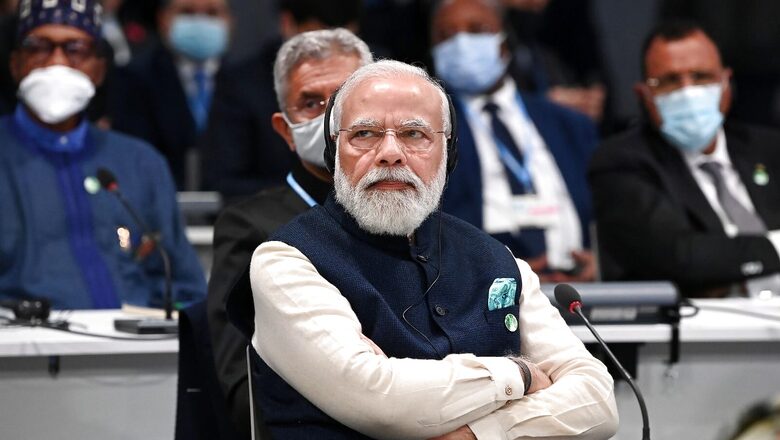
views
In the fiercest opposition to the Glasgow climate summit’s draft agreement published Wednesday, Bolivia’s chief negotiator Diego Pacheco said his country and 21 other allied nations, which includes India and China, oppose the entire section on climate change mitigation.
The group, which calls itself Like Minded Developing Countries (LMDCs) and includes Bangladesh, Sri Lanka, Iran, Indonesia, and Malaysia among others, accused the developed countries of attempting to shift responsibility to the rest of the world and imposing new rules. The group has requested that the entire section on enhancing mitigation actions be changed.
This section contains all of the agreement’s language on reducing emissions, including a recognition that the world should aim to limit global warming to 1.5 degrees Celsius, which scientists say is required to avoid the worst climate impacts. The countries’ main point of contention, according to Pacheco, was urging everyone to raise their emission targets for COP27 by the end of 2022.
He argued that developing countries should not be held to the same standards as rich countries, which have historically played a larger role in the climate crisis. He also accused rich countries of attempting to “transfer responsibility” to the Global South, CNN reported.
“History matters and history is very important to understand and to put in the context in the discussion on ambition,” he said, adding that it “would be impossible for many countries in the group to achieve net-zero emissions by mid-century (2050).”
Pacheco called the draft the “new carbon colonialism” and said the 2050 net zero targets being “forced” on developing countries, while ignoring the developed world’s historical responsibilities as well as the principles of equity and common but differentiated responsibilities (CBDR) enshrined in the UN Framework Convention on Climate Change (UNFCCC), according to reports.
Pacheco made it clear that such a transition would be impossible unless rich countries began paying their fair share, including for developing countries to adapt to the crisis’s effects. This week, developing countries have repeatedly complained about so-called climate finance, and it has emerged as the most significant sticking point impeding the talks.
Prime Minister Narendra Modi, who had earlier at the summit announced India’s pledge to become a net-zero emissions country by 2070, had also talked about climate finance in his speech. He had called for developed nations to fulfil the promised $1 trillion as climate finance, saying this should be tracked the same way as climate mitigation.
“India expects developed countries to make $1 trillion available as climate finance as soon as possible. As we track the progress of climate mitigation, we must also track climate finance. Justice would truly be served if pressure is put on those countries that have not lived up to their climate finance commitments,” Modi had said.
India has repeatedly called for richer and developed nations to take increased responsibility in mitigating the climate crisis, while assisting developing nations towards their goals.
After the recently-held G20 Summit, Union Minister Piyush Goyal had said that developed nations that have already enjoyed the fruits of low-cost energy must aim to achieve net zero much faster in order to help the developing countries pursue their development goals. India’s G20 Sherpa had also expressed satisfaction at the language of the summit’s communique “confirming that the developed world has acknowledged that they have not done enough in terms of meeting their commitments”.
‘Rich Countries Not Doing Enough’
According to a report released this week by Climate Action Tracker, even with all of the pledges made at COP26, the world is on track for 2.4 degrees of warming. Closing that gap will necessitate significant and sustained reductions in greenhouse gas emissions over the next decade, according to the latest UN climate science report.
However, this comes at a cost, and there are valid reasons for developing countries to be dissatisfied. Climate change affects more developing countries than wealthy ones, and they collectively played a much smaller role in causing the crisis.
A report by CNN states that rich countries agreed more than a decade ago to transfer $100 billion per year to developing countries to assist them in transitioning to low-carbon economies and adapting to the climate crisis.
Not only has the developed world failed to meet the $100 billion target by 2020, but developing countries claim it is insufficient in the first place. They also want a 50-50 split between mitigation and adaptation (measures to reduce emissions). Far more money has flowed to emission-cutting measures.
Talks Headed for Rocky Conclusion
Countries at the UN climate summit are hardly any closer to agreement on the last day of the summit, over whether national emissions cutting plans must be ramped up in the short term, how climate action is reported, and how vulnerable nations are supported, AFP said in a report. “The truth is that the atmosphere doesn’t care about commitments,” said Ugandan youth activist Vanessa Nakate.
“It only cares about what we put into it or stop putting into it. Humanity will not be saved by promises.”
Draft decision texts urged countries to speed up their decarbonisation plans and submit renewed contributions by 2022, three years sooner than planned. They also included a rare mention of fossil fuels — anathema to large hydrocarbon producers but a key ask of the European Union and other advanced economies.
Host Britain says it wants COP26 to lead to commitments from countries to keep the 1.5C temperature cap goal of the Paris agreement within reach. However, current national emissions cutting plans, all told, would lead to 2.7C of heating. UN Secretary Antonio Guterres said Thursday that countries’ climate plans were “hollow” without commitments to rapidly phase out fossil fuels.
Read all the Latest India News here


















Comments
0 comment